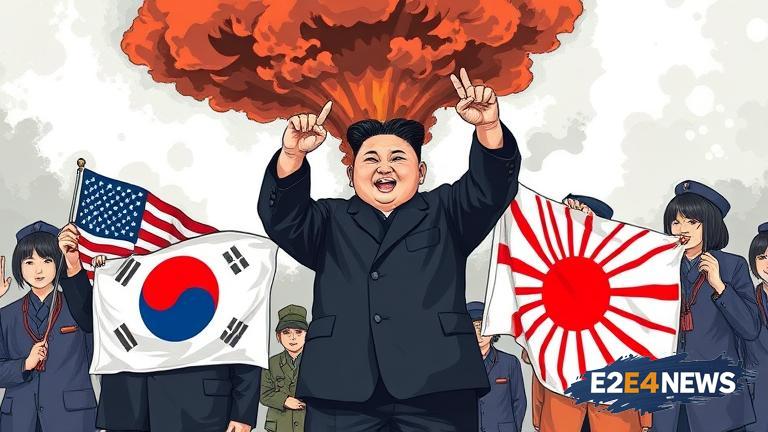The United States, South Korea, and Japan have reaffirmed their commitment to a strong alliance in the face of North Korea’s growing nuclear threats. The three nations have been working closely together to develop a comprehensive strategy to counter the North’s aggressive behavior. In recent months, North Korea has conducted a series of missile tests, including the launch of an intercontinental ballistic missile, which has raised concerns about the country’s ability to strike the US mainland. The US, South Korea, and Japan have condemned these tests and have called on the international community to impose tougher sanctions on North Korea. The three nations have also been engaged in a series of diplomatic efforts to persuade North Korea to abandon its nuclear program. However, these efforts have been met with resistance from the North, which has insisted that its nuclear program is essential for its national security. Despite the challenges, the US, South Korea, and Japan remain committed to their alliance and are working together to develop a range of military and diplomatic options to counter the North’s threats. The three nations have also been strengthening their military cooperation, with a focus on joint exercises and training programs. These efforts are designed to improve the interoperability of their military forces and to enhance their ability to respond to a range of scenarios, including a potential conflict with North Korea. The US, South Korea, and Japan have also been working closely with other countries in the region, including China and Russia, to develop a coordinated approach to the North Korea issue. However, the relationship between the US and China has been complicated by a range of issues, including trade tensions and competing interests in the region. Despite these challenges, the US, South Korea, and Japan remain committed to their alliance and are working together to promote peace and stability in the region. The three nations have also been engaged in a series of economic and cultural exchanges, which are designed to promote greater understanding and cooperation between their peoples. These efforts include educational exchanges, cultural events, and trade missions, which are designed to promote greater economic cooperation and people-to-people ties. The US, South Korea, and Japan have also been working together to promote greater regional cooperation, including through organizations such as the Association of Southeast Asian Nations (ASEAN) and the Asia-Pacific Economic Cooperation (APEC) forum. These efforts are designed to promote greater economic integration and cooperation in the region, and to address a range of common challenges, including terrorism, piracy, and natural disasters. The US, South Korea, and Japan have also been engaged in a series of efforts to promote greater transparency and accountability in the region, including through the promotion of human rights and the rule of law. These efforts are designed to promote greater stability and prosperity in the region, and to address a range of common challenges, including corruption, poverty, and inequality. Overall, the alliance between the US, South Korea, and Japan remains strong, and the three nations are working together to promote peace, stability, and prosperity in the region. The US, South Korea, and Japan are committed to their alliance and are working together to address a range of common challenges, including the threat posed by North Korea’s nuclear program. The three nations are also engaged in a series of efforts to promote greater regional cooperation and to address a range of common challenges, including terrorism, piracy, and natural disasters. The US, South Korea, and Japan are working together to promote greater economic integration and cooperation in the region, and to address a range of common challenges, including corruption, poverty, and inequality. The alliance between the US, South Korea, and Japan is a key component of regional security, and the three nations are working together to promote peace, stability, and prosperity in the region.
